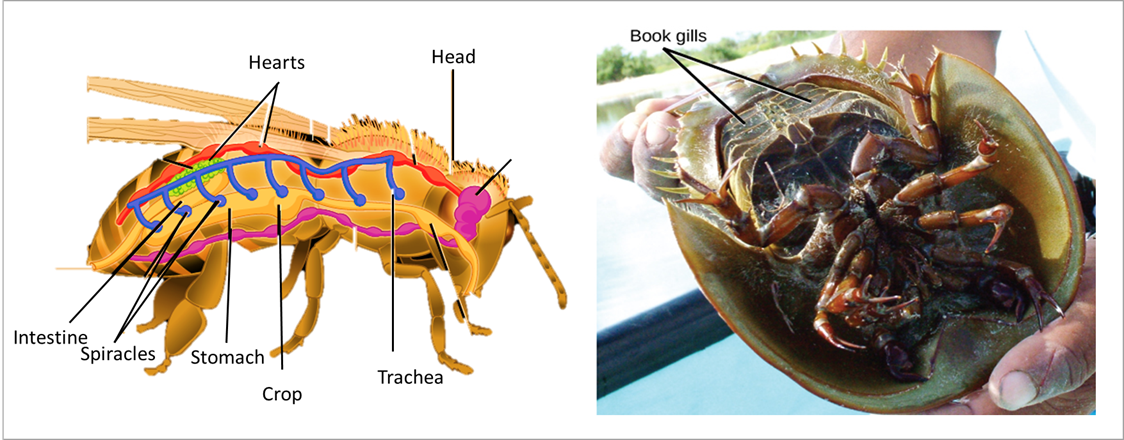
Respiration in arthropods occurs through
A. Gills
B. Book lungs
C. Trachea
D. All of the above
Answer
603.3k+ views
Hint: Arthropods are the invertebrate animals that are found in all the types of habitats i.e. terrestrial, freshwater, and marine and they have acquired the respiratory organs accordingly.
Complete answer:
All the given types of respiratory organs are found in the different classes of the arthropods because they vary tremendously in their habitats and are found in terrestrial as well as marine and freshwater habitats and thus they have different types of respiratory organs as per their habitat. There are a wide variety of animals present on the earth and based on the habitat, all the organisms can be classified into three broad categories as below –
Terrestrial – this category includes the organisms that are primarily living on land.
Freshwater – in this category, the organisms living primarily in the river, pond, lakes, and other freshwater bodies are included.
Marine – this category includes the organisms that are living in saltwater bodies like oceans.
According to their primary habitat, different organisms have developed different modes of respiration. Terrestrial organisms either use lungs, book lungs, or trachea as organs of respiration while the organisms living in water bodies, either marine or freshwater, rely on gills or skin for the gaseous exchange. Gills are the paired respiratory organs and help in extracting oxygen from the surrounding water whereas the book lungs are highly vascular organs consisting of thin plates arranged like pages of a book. The trachea form a system of air filled tubes that open outside of the body of organisms at one end and the other end lies near the tissues inside the body.
So, the correct answer is “All of the above”.
Note: Crustaceans like prawns, crabs, and lobsters respire through gills while the arthropods belonging to class Arachnida such as scorpions, spiders, etc. use book lungs and trachea for respiration. In the organisms belonging to classes Insecta, Myriapoda, and Onychophora, the trachea is the main respiratory organ.

Figure: Respiratory organs in arthropods
Complete answer:
All the given types of respiratory organs are found in the different classes of the arthropods because they vary tremendously in their habitats and are found in terrestrial as well as marine and freshwater habitats and thus they have different types of respiratory organs as per their habitat. There are a wide variety of animals present on the earth and based on the habitat, all the organisms can be classified into three broad categories as below –
Terrestrial – this category includes the organisms that are primarily living on land.
Freshwater – in this category, the organisms living primarily in the river, pond, lakes, and other freshwater bodies are included.
Marine – this category includes the organisms that are living in saltwater bodies like oceans.
According to their primary habitat, different organisms have developed different modes of respiration. Terrestrial organisms either use lungs, book lungs, or trachea as organs of respiration while the organisms living in water bodies, either marine or freshwater, rely on gills or skin for the gaseous exchange. Gills are the paired respiratory organs and help in extracting oxygen from the surrounding water whereas the book lungs are highly vascular organs consisting of thin plates arranged like pages of a book. The trachea form a system of air filled tubes that open outside of the body of organisms at one end and the other end lies near the tissues inside the body.
So, the correct answer is “All of the above”.
Note: Crustaceans like prawns, crabs, and lobsters respire through gills while the arthropods belonging to class Arachnida such as scorpions, spiders, etc. use book lungs and trachea for respiration. In the organisms belonging to classes Insecta, Myriapoda, and Onychophora, the trachea is the main respiratory organ.

Figure: Respiratory organs in arthropods
Recently Updated Pages
Master Class 11 Computer Science: Engaging Questions & Answers for Success

Master Class 11 Business Studies: Engaging Questions & Answers for Success

Master Class 11 Economics: Engaging Questions & Answers for Success

Master Class 11 English: Engaging Questions & Answers for Success

Master Class 11 Maths: Engaging Questions & Answers for Success

Master Class 11 Biology: Engaging Questions & Answers for Success

Trending doubts
One Metric ton is equal to kg A 10000 B 1000 C 100 class 11 physics CBSE

There are 720 permutations of the digits 1 2 3 4 5 class 11 maths CBSE

Discuss the various forms of bacteria class 11 biology CBSE

Draw a diagram of a plant cell and label at least eight class 11 biology CBSE

State the laws of reflection of light

Explain zero factorial class 11 maths CBSE




